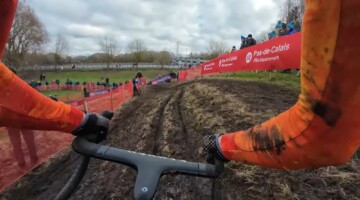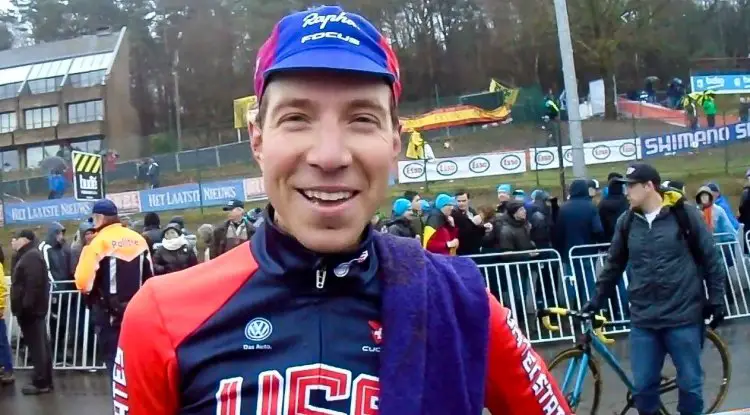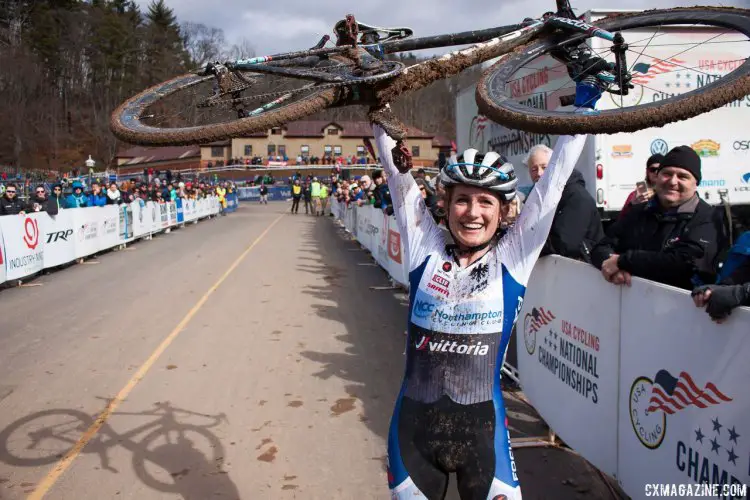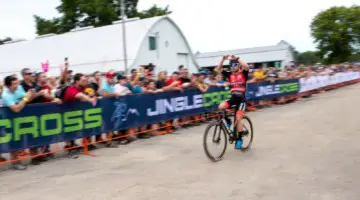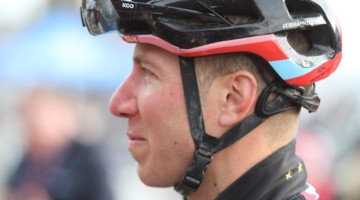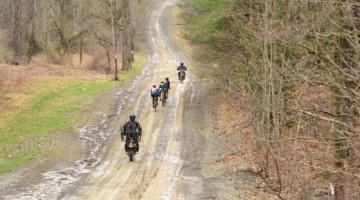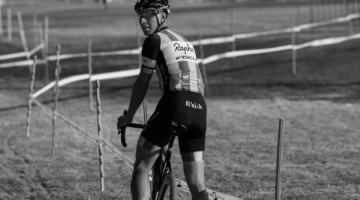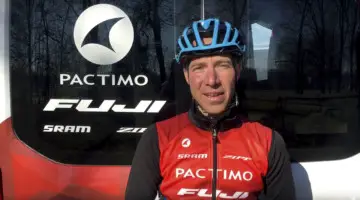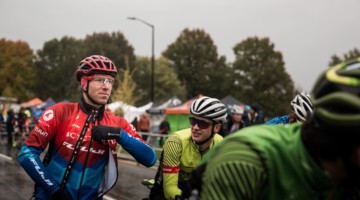“Can I call you right back? My ride went a little long and I’ve got to check out of a hotel!”
“Sure. Not a problem.”
“Thanks!”
We’ve all been there. A ride goes long and the rest of your day gets pushed back. It’s a great problem to have.
When Jeremy Powers called me back he was overly apologetic and heading home from Sea Otter. He was eager to talk about his offseason and the coming year, which I was curious about having not spoken with him since that January Sunday in Asheville, North Carolina, where Powers won his fourth National Championship.
Cyclocross Magazine: Generally speaking, how is your offseason going?
Jeremy Powers: Things are going really well. I had a nice break, but no real vacation. We moved into a new house right after the season and there were lots of things to do with that. We did go to Tokyo at what would have been my normal vacation time, so we had a mini vacation there and stayed a few extra days. When we came back home I licked my wounds, hung out on the couch and did house projects.
I took 5 weeks off the bike, none of my typical cardio, for heart health. There are all these studies out there coming out on that and for long-term health I think it’s important. Stephen [Hyde] and I did that this year. It’s tough, because you’re a bike racer and itching to go. But it’s important to change it up and stay healthy obviously. So I’ve done things like low intensity hiking instead.
Overall, it’s been the best offseason I’ve ever had. I know I’ve said that before, but the stress level has been very low and I feel really good!
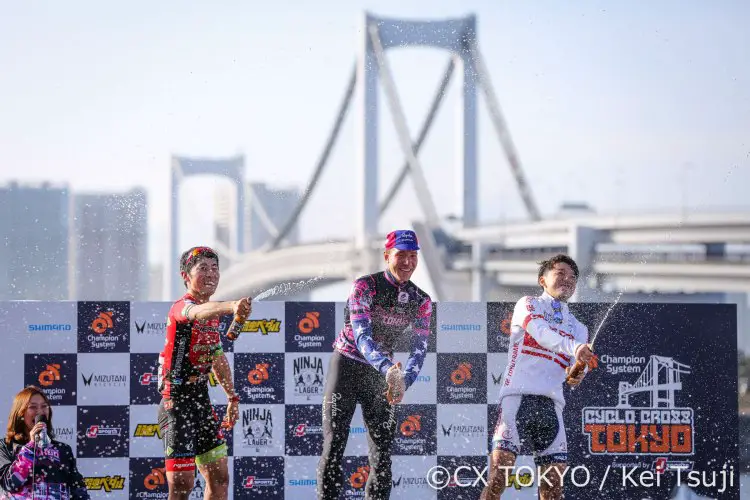
File photo of Jeremy Powers celebrating after his win in Tokyo on the Men’s Elite podium. (l-r) Kosaka, Powers and Takenouchi. 2016 Cyclocross Tokyo © Kei Tsuji
CXM: Nobody holds peak fitness year round, but do you go a step further and “cut loose” some during the offseason? Do you see things like weight gain like some of us weekend warriors do?
JP: I think I can hold that top-end form for about 3 weeks, and I think that’s fairly doable for many racers. More than that and it’s really pretty tough.
But what you’re talking about, that’s the period I’m currently in. It’s healthy to have ebbs and flows over the year. You know, time at the top of the mountain ends and things change throughout the year. From the start to the end of the year weight can fluctuate by 8-10 pounds.
CXM: When will the “real work” of gearing up for the coming season start for you or has it started already?
JP: Not in terms of mid-season intensity, but things never really stop. There’s always the planning, like with Ellen [Noble], working on team things, logistics. That stuff never ends.
With training specifically, there’s the micro, specific things and then there’s the high-level macro stuff and that’s the same, like base miles, which I’m starting on. But I’ve already done some specific work too. I’m doing more core work and less weights this year. I did more weights last year, and I went into the season a little heavier, just a few pounds, which doesn’t sound like much, but I feel like it hurt me. So I’m currently doing less gym time, and doing more specific work that’s yielded the best results for me.
CXM: Where will your season start and what does your early season calendar look like?
JP: I’m looking at Rochester and some smaller, non-UCI races to get warmed up. I’ve heard that some of the Europeans are coming over early with the World Cups here. When that’s the case, that’s my time to represent and I’ll be looking to be at my very best for that time of year for those races.
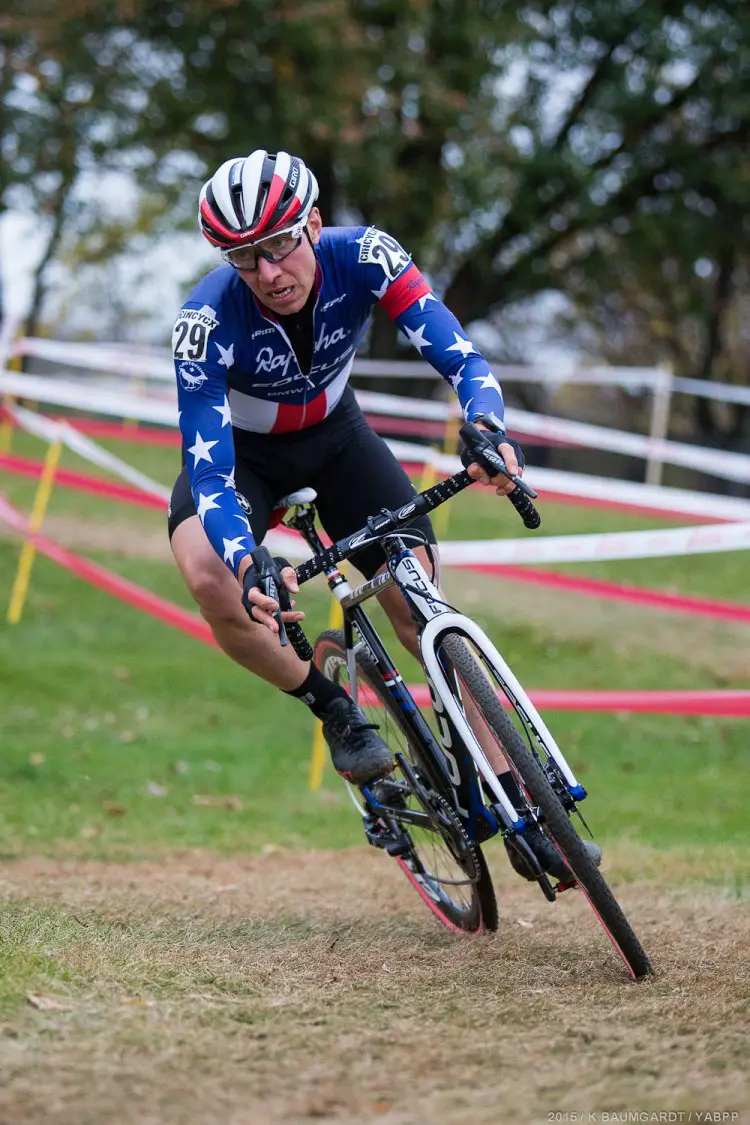
Powers continued his domestic domination in 2015 with wins at events like Kings CX. © K. Baumgart / Cyclocross Magazine.
CXM: A few years ago you made the move to focus exclusively on cyclocross. Are your offseasons significantly different now since making that switch? Does it change each year?
JP: I was lucky with Jelly Belly. With the right program you can do both road and ‘cross. Like a May to June or early July road season. But ultimately it creeps on both ends for a number of reasons and it ends up that as a cyclocross racer you’re over racing and risking injury.
I won’t do pro road racing again. I love it, but the dangers of it, I’m over it. I’ve seen someone die. It was stressful. And 90 race days was a lot for me. I don’t think it’s healthy for me. And the effects of the stress on a personal level is high.
Now, in the offseason it’s not less work, but ultimately I feel more fulfilled. As a pro cyclocross racer you race six months out of the year. That’s a lot. The work ethic changes because of the condensed nature of the season, but you get more focused in response in the offseason.
CXM: Post-season reflections are important for any athlete looking to make improvements going forward. You had a pretty remarkable year domestically in 2015 as well as 2014. Do you hope to repeat those performances and do you think it’s possible?
JP: Towards the end of last season, around the time of Nationals and the World Cup in France I hurt my back pretty severely. It was bad to the point that I got an MRI and I ended up doing a lot of rehab to get it back to normal. That’s been part of my early offseason like we were talking about before and so far so good, as I’m not experiencing any more pain.
So I have to be realistic recovering from an injury like that, but I totally think it’s possible to do as well as last year or the year before. That’s the goal of course, but there are always challenges.
There’s also new blood coming up. Tobin [Ortenblad] and Logan [Owen] will continue to develop, Stephen [Hyde] too. As for me, I’ve gotten better in some areas and not in other areas where other riders have shown improvement. It’s a process.
Recovery is also harder now too than compared to when I was younger. Starts are tougher. Those sorts of things, whatever it is, everyone struggles with. But I don’t feel I’ve had a drastic slow down over the last few years. But others are stepping up and you see it when they are racing well in Europe.
CXM: What about Europe. How are you measuring success there?
JP: Top 10 or even top 20 in Europe is significant because those fields are so deep. But the guys I just mentioned, me, if we’re all racing well there, we’re making progress.
CXM: Every racer looks to make improvements from one season to the next. The question becomes how to do that. Are you considering specific changes to your approach for next year?
JP: There’s the personal aspect of how much and how frequently to race. And that changes as I get older. Now I’m at a place where I can mostly pick and choose what I want to do then go about making sure I’m the best that I can be at those events. That and some of the off-the bike training I mentioned earlier. Those small differences, but nothing too drastic.
CXM: When we spoke in Asheville after your win at Nationals, you mentioned that you’re now one of the “old” guys, with people like Logan Owen knocking on the door. From when you were the upstart to now, how is the preparation mentally different? What about physically?
JP: The mental preparation and aspect is good. Really good. Things are going the right way with the program and we see the value that we’re creating at events, for fans and, frankly, for ourselves. We’re working hard to make a more professional sport and that’s coming through I think. It’s all good there.
Physically I’m putting a small road block together to get some high intensity work in at the right time. I’m looking at things like Tulsa Tough, New England Crit Week, and another stage race. Basically five to six weeks of hard racing back to back. Then some really good rest. I’ve done this sort of thing before, but this is being planned more seriously, with more focus. And of course I’m always trying to drink more water and sleep more!
CXM: What’s new for the coming season? New sponsors or gear?
JP: There are some new things coming along and new partners coming in. Can’t say too much yet. [Since we spoke, Aspire Racing has announced that Fizik is coming on board as the team’s shoe sponsor – Ed.] Rapha, Focus and SRAM are still here of course. Ellen being on board drew some new sponsors in, which is great. And the line there is great between Aspire and JAM Fund. Kask is a new partner and they really love cyclocross as we saw at Nationals with the big green flyover and all their support. They are like minded, which is great.
CXM: Ellen Noble moving from JAM Fund to Aspire Racing was pretty big news. She’s obviously a talent with a sixth place finish at Worlds after a blistering start and sliding just out of the top-10 before coming back. What do you see her season looking like and how will it be different to have teammate, albeit not in the races, with you?
JP: Having a teammate is going to be so great! Someone to hangout and laugh with, that’s going to be amazing. We already have a good friendship that we’ve developed over the last year.
Of course when Aspire brought on a manager in Molly [Hurford, former CXM editor -Ed.] and we had Tom Hopper and Brandon Davis on board as mechanics, it seemed sort of crazy with just one racer. But the idea was to grow. Now, with Ellen coming into our program we don’t have to change a thing. She just folds right in.
We’ll see Ellen in Europe at World Cup races, maybe not everyone of them, but most of them. She has a pretty good schedule, similar to mine, and she won’t be over raced. She’ll of course focus on Nationals and Worlds as well as the Pan American Championships, which she won last year. She’ll be racing Women’s U23 at those events. And then there will be some C1 and some select C2 races, again, similar to my schedule. We may do some split weekend stuff too.
CXM: What role will you play in her continued development?
JP: Ellen has a great coach in Alec Donahue, the same as Stephen’s and the “A” in JAM Fund. But I’m giving some guidance and schedule help, and I’m there for her. I make suggestions and give her opportunities. It’s great to be sharing tips with her as it’s obviously not competitive between us.
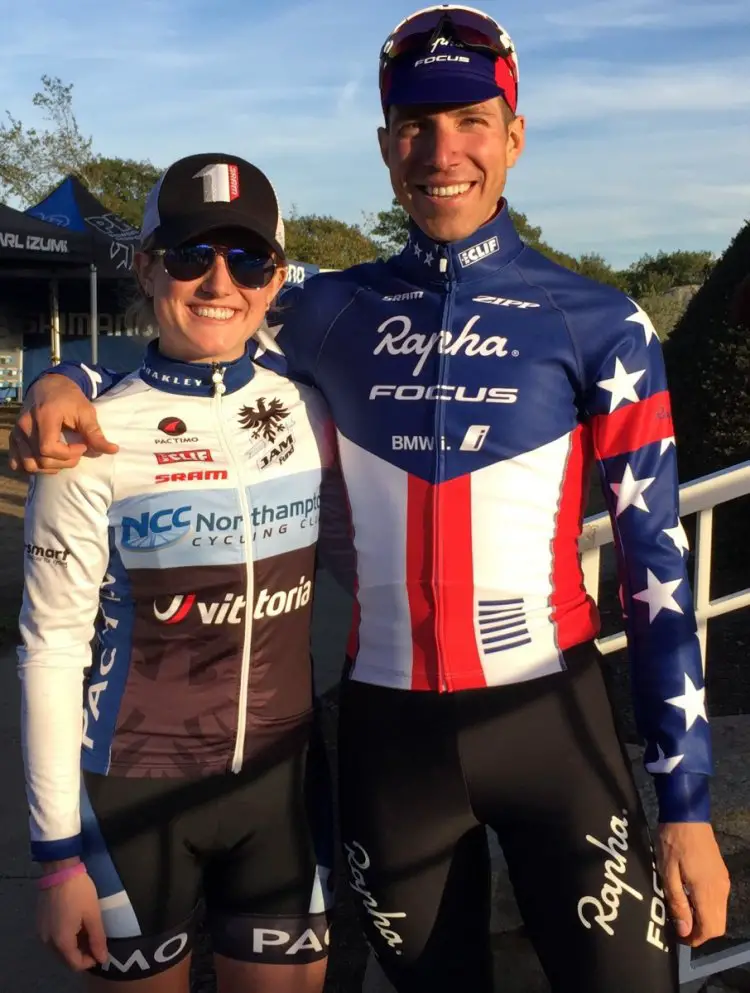
Jeremy Powers, owner of Aspire Racing, announced the expansion of his program with the signing of Ellen Noble for the 2016-17 cyclocross season. Photo courtesy: Aspire Racing
CXM: How many more riders do you think Aspire can support at the sport’s top level? Do you have a goal number of riders in mind? Where will you look for talent to support aside from JAM Fund?
JP: For now, any of the riders we work with will be in close proximity to where we live. That’s where it’s at, at least for now. And the plan is to go through JAM Fund to offer that next step for cyclocross riders. It’s easy for road because there are so many riders. But for cyclocross it is tough. We’re doing as much as we can, and I don’t know where the cap is. But for sure it will be slow growth.
CXM: Fans saw you racing on both cantilever and disc brake bikes this past year and in the past you’ve mentioned that non-disc bikes made traveling to some races easier. What else informs your decision on which brake to race? Do you have a natural preference for day-to-day training?
JP: We’re moving forward with disc brakes 100%. Our program is on discs. I believe in the technology and I know it works. When we first made the decision with discs, we had both on hand, and I rode disc to test it out. Disc is superior in the conditions we race in, especially after November. There’s also the logistical aspect of having both on hand. With two racers and everything else it’s easier to manage a single fleet of wheels and such.
CXM: During the offseason, are you doing any of your own mechanical work?
JP: Oh yeah! I just cleaned bikes for an hour and a half today. I love cleaning bikes. I have someone helping out some during the summer with bigger stuff, but general maintenance, cleaning, I do that. I enjoy the process. It’s a little zen for me. I hate wrapping bars as I’m not that good at it!
CXM: I don’t like wrapping bars either! Is there any chance we’ll see you racing on SRAM’s new eTap system this coming year?
JP: I’ve tried it. It’s nice. But it’s really up to SRAM and the direction they want to go. Currently it’s not in the plan.
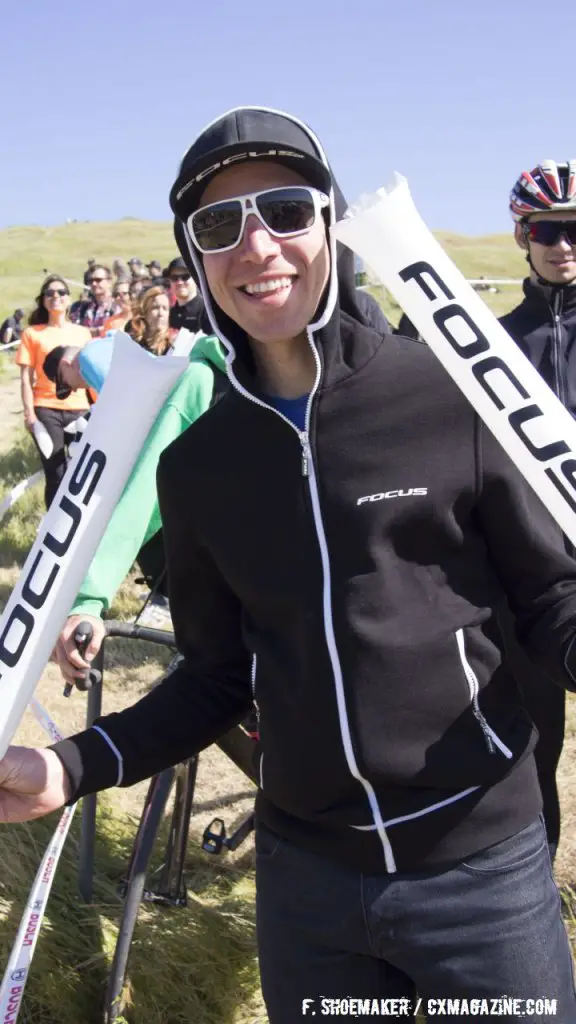
Jeremy Powers cheers on riders at the eMTB race at Sea Otter. © Frank Shoemaker / Cyclocross Magazine
CXM: When our staffers saw you at Sea Otter earlier this month they, along with some other folks, were wondering why you weren’t in the cyclocross race. There were some other big names there. Why sit it out?
JP: It’s not the time of year for me. I’m doing my low intensity stuff. I also don’t want to show up for a race I’m not prepared for. So I stay away from the race and enjoy my time at the festival with my partners like Focus and WD-40. I’m keeping my intensity low until May or so. That’s the beauty of not racing early road race anymore, I can afford to do that low intensity/high volume stuff now. It’s a system that’s proven well for me and I don’t want to mess with it.
CXM: There was also saw the eMTB race at Sea Otter. What do you make of that? Is there a sport there?
JP: There’s something to it. And obviously I like the fact that what’s being done is open and openly discussed. The way I look at it overall is for some days I would like [an eMTB]. There are days I want to have fun and go as far as I like but not go as hard. Also, for some of the folks I ride with, I’d love to have them be able to do a whole ride with me instead of turning back at a given point. Like my dad. I’d love to have my dad with me climbing while I’m on my regular bike.
For folks [who] used to go fast and want to again or riders that want to go further, it’s great. The bike helps you see the word and gives a sense of adventure. It’s kind of a no brainer. For folks like me, you can go as fast and far without going that hard. For others, it helps them get on a bike and just go.
Now should it be a race? I don’t know. It seems sort of closer to mini-motocross bikes. But for the recreational side, it seems great.
CXM: Thanks for taking the time Jeremy.
JP: Of course. Thank you!


